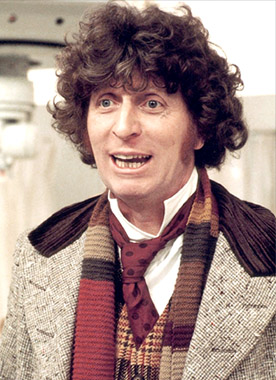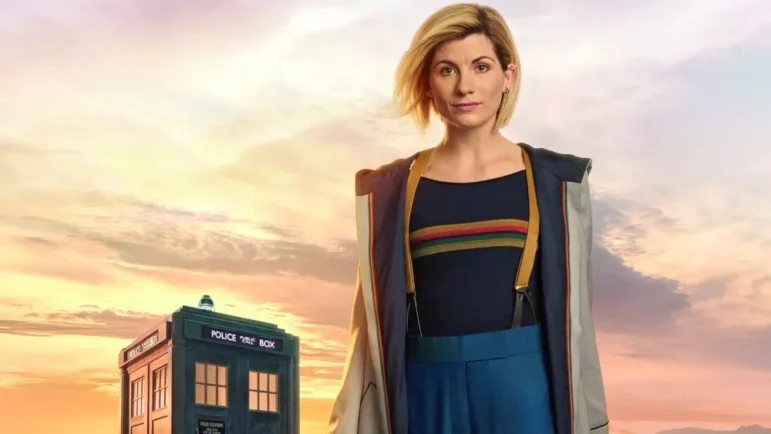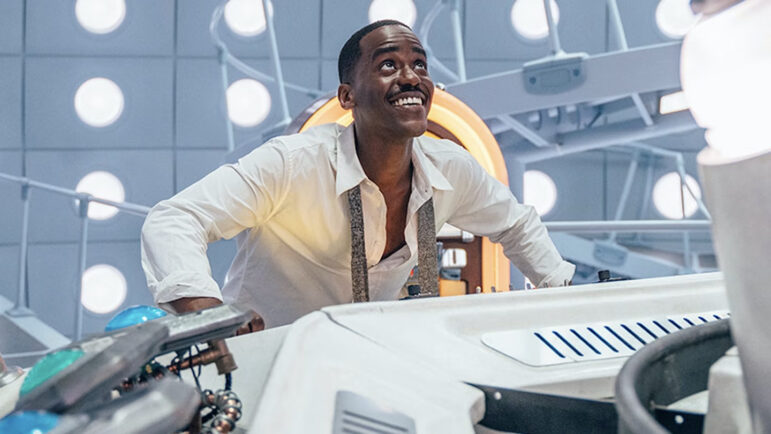
I was eight years old when I first watched an episode of Doctor Who. It was 1979, and I remember being enamored by this funny, out-of-place man in a ridiculously long scarf with his robot dog, fighting aliens and bad guys — not with violence, but with humor and intellect. As he traveled around in his blue phone box through time and space, a myriad of companions in tow, he would save planets, put an end to oppression, and still have time enough for tea.

Oh, Doctor! My Doctor! Tom Baker as the 4th Doctor. Credit: BBC – British Broadcasting Corporation, fair use.
As if traveling anywhere (and anywhen) wasn’t enough, the Doctor, an alien from a highly advanced race, could cheat death by regenerating into a new person — complete with all his memories but sporting a new face, body, and even personality (a convenient tool to allow the BBC to change actors and keep the show running). This permitted the show to continue from its initial inception in 1963 to its finale in 1987 and through its resurrection in 2005 to the present day.
In all that time, the Doctor has had many incarnations. One thing in particular that had always resonated with me (though I could not have articulated it all those years ago) was the lack of sexuality expressed by the titular character. Though he would most often travel with a younger woman, there was never even a hint of attraction between them, their relationship perhaps best expressed as that between a mentor and student.
As I grew up and embraced my own queerness, the Doctor remained one of my biggest role models. His asexuality made him sort of “queer,” and this created a sort of “safe space” in which I could more comfortably exist. He was unlike other male characters in that he did not engage in what is now called toxic masculinity. He did not participate in classism, treating everyone equally. He embraced differences in race and culture. He championed the underdog. And he did it with humor, wit, and not a small amount of flair.
Since the show’s resurrection, the character of the Doctor has seen a few romantic inclinations creep in from time to time (he even got married at least twice!). But he has also shown openness to same-sex attraction, even being kissed by another man in the first season of the new series.
Additionally, a few characters would reveal their queerness here and there. Even a couple of the Doctor’s companions would openly identify as members of the LGBTQ+ community.
Then, in 2018, the Doctor regenerated into a woman.

Jodie Whittaker as the 13th Doctor. Image credit: BBC.
While there was, of course, the usual backlash that occurs when any creative project decides not to center male perspectives, this was widely lauded as a progressive step forward. This gave the show an opportunity to address the social issue of gender inequality, even if mentioned only briefly on screen. Perhaps more important was the opportunity for women, girls, and those assigned female at birth to finally see themselves represented in the show in a way that centered them for the first time.
Without explicitly using the terminology, the Doctor was shown to be technically trans, giving both cis women and trans people, in general, a greater ability to identify with a deeply loved hero.
Let’s just take a moment to reflect on the importance of that. In what has been not only a British institution but also a global cult phenomenon, a near god-like character, much beloved by millions, was shown to effortlessly switch genders, and to have same-sex attraction, a move that I feel helps to empower girls, women, and AFAB people, whether queer or straight, giving them access to an egregore that had thus far mostly been only available to boys and men.
![]()
We hate to keep asking, but it is serious. Costs have hit us too.
We are grateful to our readers for your support, however it manifests. Right now, we need readers who can help fund Pagan journalism to help us continue serving the community. This is the type of story you only see here. This is how to help:
Tax Deductible Donation | PayPal Donations | Join our Patreon
We remain one of the most widely-read news magazines within modern Paganism, and our reporters and columnists remain dedicated to a vision of journalism for and about our family of faiths.
You can also help us by sharing this message on your social media.
As always, thank you for your support of The Wild Hunt!
![]()
This year, for the celebration of Doctor Who’s 60th anniversary, the franchise doubled down on its queer and trans-positive stance by explicitly stating that the Doctor is “non-binary.” The anniversary specials even had a trans character play an integral part in the story.
And then the Doctor regenerated. Again. Well, sort of. I’ll give no spoilers here, but the important thing to know is that the 15th (and now current) Doctor is played by Ncuti Gatwa, the first Black and first queer actor to lead the show. Doctor Who is unabashedly for everyone.

Queering time and space! Ncuti Gatwa is the 15th Doctor! Image: BBC.
As a child, I imagined myself in these stories with the funny, out-of-place man. I identified with him because I also felt out of place, and his not-typically masculine demeanor felt safe and somehow familiar to me. As a queer adult, I can now see myself represented in these stories even more clearly, a validation that I didn’t know was needed.
Maybe it seems frivolous. After all, it’s just a television program. But let me tell you, if that sensitive eight-year-old boy had been able to see the diversity of Doctors that was to come (and just how popular and accepted they would be), that boy would have had a lot less pain and worry about who they were, and a lot more stress-free time looking at the stars, and dreaming of a better future.
Editor’s note: Doctor Who has a more convoluted streaming profile than any other franchise, I have to think. The 60th anniversary specials and the new season are streaming on Disney+. The rest of the “revival series,” from 2005 to present, is streaming on Max. The “classic series,” from 1963 to 1987, is available on Tubi and Britbox. That’s in the United States, of course – in the United Kingdom, it’s all on the BBC iPlayer.
The Wild Hunt is not responsible for links to external content.
To join a conversation on this post:
Visit our The Wild Hunt subreddit! Point your favorite browser to https://www.reddit.com/r/The_Wild_Hunt_News/, then click “JOIN”. Make sure to click the bell, too, to be notified of new articles posted to our subreddit.